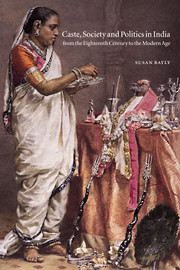Book contents
- Frontmatter
- Introduction
- 1 Historical origins of a ‘caste society’
- 2 The ‘Brahman Raj’: kings and service people c. 1700–1830
- 3 Western ‘orientalists’ and the colonial perception of caste
- 4 Caste and the modern nation: incubus or essence?
- 5 The everyday experience of caste in colonial India
- 6 Caste debate and the emergence of Gandhian nationalism
- 7 State policy and ‘reservations’: the politicisation of caste-based social welfare schemes
- 8 Caste in the everyday life of independent India
- 9 ‘Caste wars’ and the mandate of violence
- Glossary
- Bibliography
- Index
- Map 1 The break-up of the Mughal empire and the emergence of the successor states, c. 1766"
- References
1 - Historical origins of a ‘caste society’
Published online by Cambridge University Press: 28 March 2008
- Frontmatter
- Introduction
- 1 Historical origins of a ‘caste society’
- 2 The ‘Brahman Raj’: kings and service people c. 1700–1830
- 3 Western ‘orientalists’ and the colonial perception of caste
- 4 Caste and the modern nation: incubus or essence?
- 5 The everyday experience of caste in colonial India
- 6 Caste debate and the emergence of Gandhian nationalism
- 7 State policy and ‘reservations’: the politicisation of caste-based social welfare schemes
- 8 Caste in the everyday life of independent India
- 9 ‘Caste wars’ and the mandate of violence
- Glossary
- Bibliography
- Index
- Map 1 The break-up of the Mughal empire and the emergence of the successor states, c. 1766"
- References
Summary
INTRODUCTION: ‘HISTORICISING’ THE ANTHROPOLOGICAL MODELS
Caste is not and never has been a fixed fact of Indian life. Both caste as varna (the fourfold scheme of idealised moral archetypes) and caste as jati (smaller-scale birth-groups) are best seen as composites of ideals and practices that have been made and remade into varying codes of moral order over hundreds or even thousands of years. The context for this fluidity has been the subcontinent's remarkable diversity in culture and physical environment, and above all the diversity of its states and political systems. Those conventions of rank and corporate essence that are often seen as the defining features of caste have been shaped, critiqued and reconstituted in all sorts of ways, both century by century and region by region. As will be seen in the three final chapters, these processes of invention and reformulation are still taking place today at the local level, and also in the wider context of regional and pan-Indian political and social conflict.
Even in the distant past, recognisably castelike ideologies and practices were followed by some people in most or all of the subcontinent's regional cultures. Yet until relatively recent times, many Indians were still comparatively untouched by the norms of jati and varna as we now understand them. This was true not only of the forest and hill people who are now called ‘tribals’, but also of much larger groups of powerful plains-dwellers and martial pastoralists. Even under the Raj, caste as a ‘system’ was far less uniform and all-pervading than many colonial commentators believed. Nevertheless, in the centuries immediately preceding the British conquest, social life in almost all areas of the subcontinent became significantly more castelike than had been the case in earlier times.
Keywords
- Type
- Chapter
- Information
- Publisher: Cambridge University PressPrint publication year: 1999



